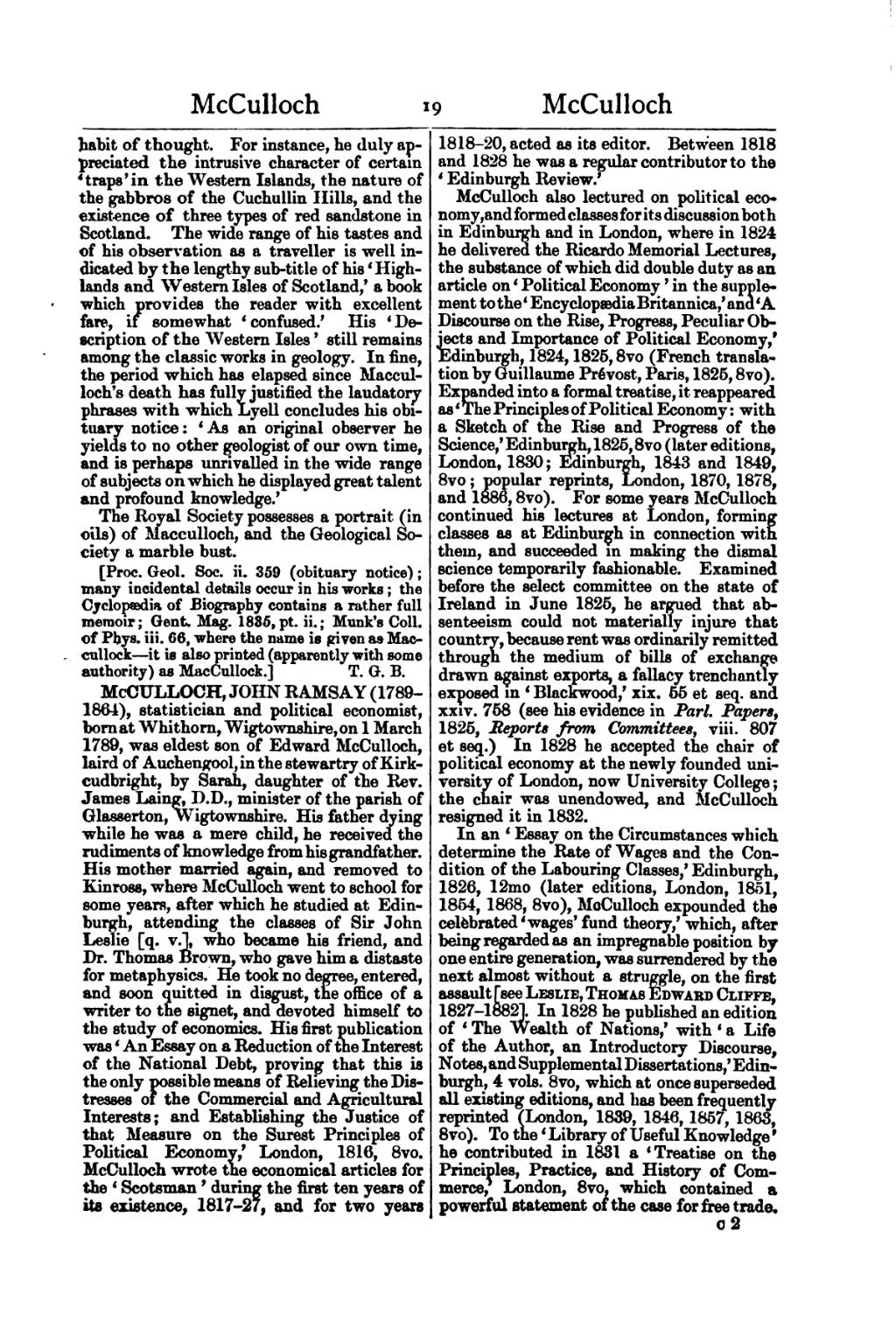habit of thought. For instance, he duly appreciated the intrusive character of certain 'traps' in the Western Islands, the nature of the gabbros of the Cuchullin Hills, and the existence of three types of red sandstone in Scotland. The wide range of his observation as a traveler is well indicated by the sub-title of his 'Highlands and Western Isles of Scotland,' a book which provides the reader with excellent fare, if somewhat 'confused.' His 'Description of the Western Tales 'still remains among the classic works in geology. In fine, the period which has elapsed since Maccullock's death has fully justified the laudatory phrases with which Lyell concludes his obituary notice: 'As an original observer he yields to no other geologist of our own time, and is perhaps unrivalled In the wide range of subjects on which he displayed great talent and profound knowledge.'
The Royal Society possesses a portrait (in oils) of Macculloch, and the Geological Society a marble bust.
[Proc. Geol. Soc. ii. 359 (obituary notice); many incidental delails occur in his works; the Cyclopædia of Biography contains a rather full memoir: Gent. Mag. 1835, pt. ii.; Munk's Coll. of Phys. iii. 65, where the name is given as Maccullock — it is also printed (apparently with some authority) as MacCullock.]
McCULLOCH, JOHN RAMSAY (1789–1864), statistician and political economist, born at Whithorn, Wigtownshire, on 1 March 1789, was eldest son of Edward McCulloch, laird of Auchengool, in the stewartry of Kirkcudbright, by Sarah, daughter of the Rev. James Laing, D.D., minister of the parish of Glasserton, Wigtownshire. His father dying while he was a mere child, he received the rudiments of knowledge from his grandfather. His mother married again, and removed to Kinross, where McCulloch went to school for some years, after which he studied at Edinburgh, attending the classes of Sir John Leslie [q. v.], who became his friend, and Dr. Thomas Brown, who gave him a distaste for metaphysics. He took no degree, entered, and soon quitted in disgust, the office of a writer to the signet, and devoted himself to the study of economics. His first publication was ‘An Essay on a Reduction of the Interest of the National Debt, proving that this is the only possible means of Relieving the Distresses of the Commercial and Agricultural Interests; and Establishing the Justice of that Measure on the Surest Principles of Political Economy,’ London, 1816, 8vo. McCulloch wrote the economical articles for the ‘Scotsman’ during the first ten years of its existence, 1817–27, and for two years 1818–20, acted as its editor. Between 1818 and 1828 he was a regular contributor to the ‘Edinburgh Review.’
McCulloch also lectured on political economy, and formed classes for its discussion both in Edinburgh and in London, where in 1824 he delivered the Ricardo Memorial Lectures, the substance of which did double duty as an article on ‘Political Economy’ in the supplement to the ‘Encyclopædia Britannica,’ and ‘A Discourse on the Rise, Progress, Peculiar Objects and Importance of Political Economy,’ Edinburgh, 1824, 1825, 8vo (French translation by Guillaume Prévost, Paris, 1825, 8vo). Expanded into a formal treatise, it reappeared as ‘The Principles of Political Economy: with a Sketch of the Rise and Progress of the Science,’ Edinburgh, 1825, 8vo (later editions, London, 1830; Edinburgh, 1843 and 1849, 8vo; popular reprints, London, 1870, 1878, and 1886, 8vo). For some years McCulloch continued his lectures at London, forming classes as at Edinburgh in connection with them, and succeeded in making the dismal science temporarily fashionable. Examined before the select committee on the state of Ireland in June 1825, he argued that absenteeism could not materially injure that country, because rent was ordinarily remitted through the medium of bills of exchange drawn against exports, a fallacy trenchantly exposed in ‘Blackwood,’ xix. 55 et seq. and xxiv. 758 (see his evidence in Parl. Papers, 1825, Reports from Committees, viii. 807 et seq.) In 1828 he accepted the chair of political economy at the newly founded university of London, now University College; the chair was unendowed, and McCulloch resigned it in 1832.
In an ‘Essay on the Circumstances which determine the Rate of Wages and the Condition of the Labouring Classes,’ Edinburgh, 1826, 12mo (later editions, London, 1851, 1854, 1868, 8vo), McCulloch expounded the celebrated ‘wages' fund theory,’ which, after being regarded as an impregnable position by one entire generation, was surrendered by the next almost without a struggle, on the first assault [see Leslie, Thomas Edward Cliffe, 1827–1882]. In 1828 he published an edition of ‘The Wealth of Nations,’ with ‘a Life of the Author, an Introductory Discourse, Notes, and Supplemental Dissertations,’ Edinburgh, 4 vols. 8vo, which at once superseded all existing editions, and has been frequently reprinted (London, 1839, 1846, 1857, 1863, 8vo). To the ‘Library of Useful Knowledge’ he contributed in 1831 a ‘Treatise on the Principles, Practice, and History of Commerce,’ London, 8vo, which contained a powerful statement of the case for free trade.

